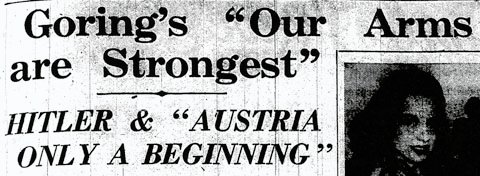
I'm cheating slightly today; the above headlines -- from the Daily Mail (p. 7) -- aren't, strictly speaking, about Czechoslovakia, but refer to speeches made by Nazi leaders at the Nuremberg rally on the weekend. But of course they were always going to be interpreted in the light of the continuing Sudeten crisis.
Hermann Goering was of course the head of the Luftwaffe as well as, at this time, probably second only to Hitler himself in terms of the Nazi hierarchy. Among other things, he called the Czech government 'ridiculous dwarfs' who were backed by 'Moscow -- the eternal, Jewish Bolshevist demons of destruction'. And he reassuringly noted that:
Germany's air fleet is the strongest in the world. Never before in history has Germany been so strong and united as now.
Hitler didn't refer directly to Czechoslovakia, but referred to the Anschluss of Austria in March, and added:
But this is only the beginning of our task. There are many great tasks before us which must still be solved.
Conflating these bits -- which the Daily Mail has done by referencing them together in the headline -- makes them sound like a threat.1 Which, let's face it, they almost certainly were, but let's not forget the power of selective editing to fabricate apparent meaning.
Remember the Daily Mail's scoop on Saturday, about the British ambassador delivering Hitler a warning that Britain would not stand aside if Czechoslovakia were attacked? Well, Henderson did not actually get to meet Hitler after all, but instead talked to other senior Nazis. From the number of times that the reader of the various papers is assured that ‘there was every reason to feel confident that the British point of view had been conveyed fully to the proper quarter [Hitler]’, as the Manchester Guardian, for one, puts it (p. 11), I get the feeling that, actually, nobody is very confident of this at all. The author of today's leading article (p. 10) agrees: 'No one can "feel assured" so long as we do not know that Hitler has been personally informed'. All eyes will be on Hitler tonight, when he may (or may not) talk about the crisis. Speculation is that he may demand a plebiscite for the Sudetens, on the question of whether they should stay in Czechoslovakia or go to Germany (p. 11).
More and more column inches are being given over to news about the crisis. In the Manchester Guardian, there's Viscount Samuel, a former Liberal leader, supporting the government's position (p. 6), some photos (‘A week-end of crisis. Scenes in London’), the leader referred to above and some notes on public reactions in London (p. 10), various bits of news from Czechoslovakia (most of p. 11), the Nuremberg speeches and reactions in France, the United States and Italy (most of p. 14), more on Nuremberg and the Czech autonomy proposals (p. 15), and four letters to the editor (p. 18). It's becoming hard to escape the crisis.
One of those letters has a very surprising author: Jawaharlal Nehru, the first prime minister of independent India. At this time he was president of the Indian National Congress, and on a visit to Europe which lasted several months, which included a trip to Czechoslovakia. Here he strongly attacks the British policy of appeasement from Manchuria to Spain, and believes that it is dragging the world into war:
All our sympathies are with Czecho-Slovakia. If war comes, the British people, in spite of their pro-Fascist Government, will inevitably be dragged into it. But, even then, how will this Government, with its patent sympathies for the Fascist and Nazi States, advance the cause of democracy and freedom? So long as this Government endures, Fascism will always be at the doorstep.
Nehru's ultimate conclusion seems somewhat self-serving, however (or at least serving the interests of the Indian people), arguing that an unfree India would have no part in such a war:
If Britain is on the side of democracy, then its first task is to eliminate empire from India. That is the sequence of events in Indian eyes, and to that sequence the people of India will adhere.
Actually, the Indian Army in the Second World War became the biggest volunteer army in history, which I don't call adhering to that sequence. But Nehru got his free India within a decade, so I suppose he wasn't complaining too much.
Here's one of those photos of the 'week-end of crisis':
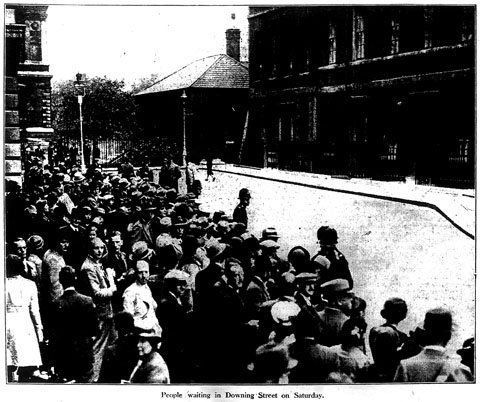
It shows the crowds waiting outside 10 Downing Street. Waiting for what? It's never been entirely clear to me why, but gathering outside the PM's residence seemed to be something that Londoners did at moments of political tension. Maybe somebody has written something about this phenomenon. Anyway, the crowds are getting bigger. Earlier in the month, there were only a few loiterers; now The Times says (p. 12) that:
In the evening there were several thousand people wedged the whole way from Whitehall to No. 10; and when the Ministers came out the police had to clear a way. There was a special cheer for Lord Halifax.
The Guardian's London correspondent notes (p. 10) that:
They have seemed like a reflection of London's restlessness, constantly drawn back to the place where the decisions are being made.
These days I suppose they would stay at home and constantly refresh BBC News instead.
![]() This work is licensed under a Creative Commons Attribution-NonCommercial-NoDerivatives 4.0 International License.
Permissions beyond the scope of this license may be available at http://airminded.org/copyright/.
This work is licensed under a Creative Commons Attribution-NonCommercial-NoDerivatives 4.0 International License.
Permissions beyond the scope of this license may be available at http://airminded.org/copyright/.
- The Mail subeditor's habit of saying ‘So-and-so's "Thing that they said"’ or ‘So-and-so & "Other thing that they said"’ in their headlines really gets on my pip. I couldn't even say why, it's just annoying. [↩]

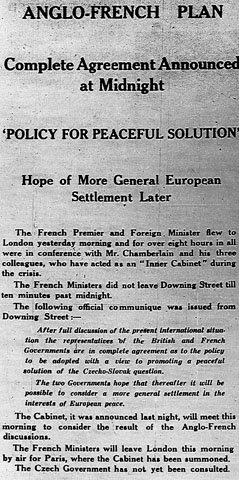
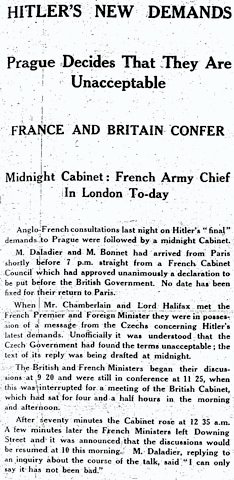
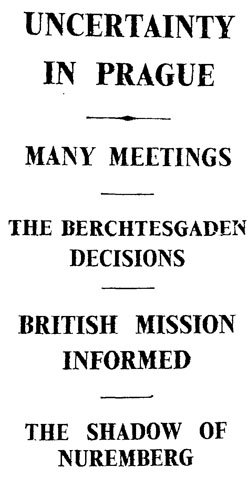
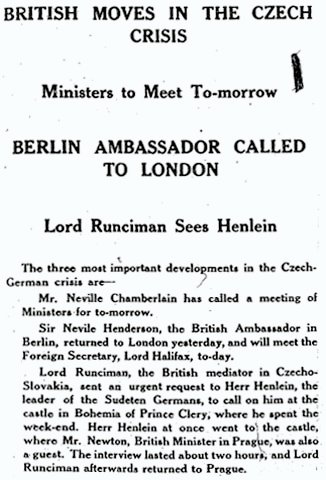
Pingback:
Airminded · Thursday, 15 September 1938